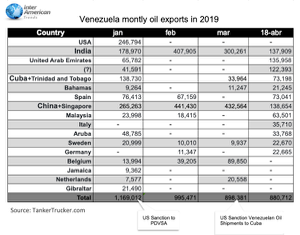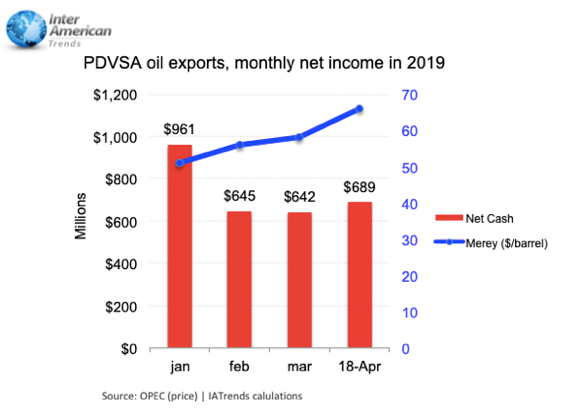The time for the purchase and imports into the United States of oil and petroleum products from the state-owned PDVSA ends this Sunday, April 28. It is the second phase of the sanctions imposed by the Office of Foreign Assets Control (OFAC) of the United States Department of the Treasury to PDVSA on January 28.
The blockade of the assets and interests of Pdvsa and its subsidiaries in the United States by OFAC – the first part of the sanctions – forced the Nicolás Maduro regime to seek other clients to place the production of 500,000 barrels per day that it exported to the American refineries in the Gulf of Mexico in 2018.
In the first instance, the Venezuelan oil minister, Manuel Quevedo, sought in China and the refineries of India (Reliance and Essar) to send a large part of the crude oil that it exported to the United States. In February, PDVSA sent 85% of the total export volume to India and China, and in March 81%, despite the declaration of Quevedo in which he announced “the suspension of oil exports to India to send it to Russia”.
A decision that has not yet materialized, because India and China are still the primary recipients of Venezuelan crude, according to the tankertracker website.
Srikanth Venkatachari, Reliance’s deputy finance director, told Reuters last week that he was “buying Venezuelan oil through Russian and Chinese companies” for the Jamnagar refinery in India. Also, he added: “We are in an active dialogue with the US Department of State on our dealings with Venezuelan oil in order to continue complying with US sanctions [on PDVSA]”.
What does seem to be happening with Russia is the sale of accounts receivable from PDVSA to the Russian oil company Rosneft. A process is known as factoring.
According to Reuters, “the Russian energy giant [Rosneft] pays PDVSA, immediately with a discount, the total amount of the invoice, avoiding [PDVSA] the usual term of 30 to 90 days it takes to receive the total transaction of the sale of oil, and [Rosneft] charges the total amount later to the buyer”. The news agency adds: “The cash ends up in the Russian banks [Russian-Venezuelan Evrofinance Mosnarbank sanctioned by the United States] or is used to settle pending payments, such as maritime services or freights so that oil exports are not interrupted”.
Cuba and Trinidad and Tobago are other countries that have received shipments of crude and refined products from the Maduro regime.
Four days ago, the Guardian newspaper of Trinidad and Tobago (T & T) published a note on a report on the website Lloyd’s List Maritime Intelligence in which “three tankers received an oil shipment in Venezuela before making a stop at T & T and then continue its course, generating doubts about the nature of the operation”. The report states “PDVSA is using the practice of “co-loading” and false berths to conceal the origin of cargo, obtaining new bills of lading (BOL) that indicate T & T, and not Venezuela as points of origin for fuel oil shipments”.
A practice used to circumvent the sanction of the United States of shipments of crude oil and products to Cuba.
Also, Spain has acquired Venezuelan oil, about 7% of PDVSA’s exports. This volume serves for the Spanish oil company Repsol to collect outstanding dividends from the loan and the participation in the joint ventures, and to supply the fuels that Citgo provided to the Maduro regime until January of this year.
The export of oil to the United Arab Emirates stands out, especially this month, 136,000 barrels/day, a volume similar to the naphtha obtained in the United States to mix with the extra-heavy crudes of the Orinoco oil belt. For what appears to be a crude exchange for gasoline.
The European countries Italy, Sweden, Germany, Belgium and the Netherlands are importers of Venezuelan oil in the first quarter of the year. Swedish Nynas has been a traditional PDVSA customer since the internationalization in 1987. The rest of the markets do not use Venezuelan heavy and extra-heavy crude in their refineries.
In terms of revenue, the impact of the sanction to PDVSA by the Trump government on the net income received by the Maduro regime was 316 million dollars. With current exports, Maduro is receiving an average of 660 million dollars a month. That would allow him to continue clinging to power, feeding the corruption and illicit activities.
The regime of Maduro and its allies know that the closing of oil exports to Cuba, China and Russia will give way to the cessation of the usurpation. So, Maduro seeks to circumvent the sanctions of the United States to continue receiving the “cash” that was generated by the export of oil to the American refineries of the Gulf.
They think they are going to get away with it.


